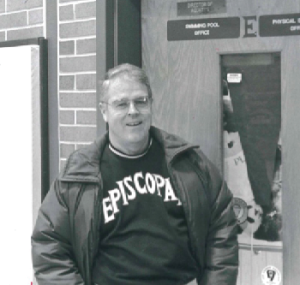Samantha Macrides ’18, Anabelle Wondrasch ’18: As Nick Sustersic ‘18 angled a volley winner cross court, EA’s boys’ tennis team clinched the championship in the inaugural George Shafer Doubles Invitational. Traditionally called the New England/Middle Atlantic tournament (NEMA), this year’s competition was held at Episcopal and renamed the George Shafer Doubles invitational after George Shafer, a teacher and coach at Episcopal for 41 years who passed away just last year.
Phillip Tobar ‘17, one of the senior captains of the tennis team, says, “Being able to win a tournament at EA named after one of the greatest coaches our tennis program has ever seen was incredible.” He continues, “This victory was symbolic of how dedicated he was to growing our program and the success he had in his career.”
Shafer’s list of accomplishments demonstrates his passion for coaching and dedication towards EA. Inducted into the inaugural Episcopal Sports Hall of Fame Class in 2000, Shafer later went on to serve on the induction committee, coaching tennis as well as football and swimming.

Thomas Kent, Varsity Tennis Head Coach and lifetime friend of Shafer, says, “His efforts to advance the game of tennis reached far beyond the walls of Episcopal.” For decades, Shafer acted as a volunteer coach for The Philadelphia Gold Cup Advanced Junior Tennis Program while serving on the board for the National Junior Tennis League. He led the Middle States Boys Interscholastic tournament and for many years and ran the prestigious Tilton Bowl. In addition, he served on the board for the Philadelphia Indoor Tennis Corporation for nearly two decades and was Chair of Operations. In recognition of his remarkable volunteer efforts, the USTA awarded him the Seymour Coren cup for his service to tennis in the Philadelphia region in 1980.
In 1999, Kent, a former student of Shafer’s, took over the boys tennis team, a daunting task given Shafer’s excellence in coaching the team to victory. Varsity Girls’ and Boys’ team coach Whittaker Powell questions, “How does one replace a legend? Well, you replace a legend with his student.”
This coaching transition was facilitated by the close bond between Shafer and Kent, which had been created when Kent was a boy at Camp Susquehannock. He explains, “George taught me not just how to hold and swing a racket, but how to analyze and orchestrate a point.” Just as Shafer taught Kent to appreciate the sport of tennis, Kent continues to use the life lessons he learned from Shafer to coach the boys’ tennis team. He recalls that Shafer “demanded of all his players a strict adherence of the principles of good sportsmanship,” just as Kent hopes to see in his own players today. While Shafer’s expertise about tennis certainly played a large role in leading his boys’ to victory, the effect he had off the court gave them the edge over their competition. Kent says, “He deeply understood that coaching at its best has as its aim to develop the kind of habits in our students that will help them navigate their lives successfully both on and off the court.”
As the boys tennis team held the trophy up high in honor of Shafer, they were joined by Shafer’s wife. Tobar reflects on that inspiring moment, as he says, “We knew it definitely meant a lot to Coach Powell and Coach Kent as Shafer was a mentor to both of them. Having the Shafer family there too was humbling and made the victory all the more special; we know that George Shafer has been a pillar in our tennis program”.
Kent echoes the past and looks towards the future with Shafer in mind, saying “The legacy he built in the nearly four decades that he spent at the helm of the program is worthy of the highest applause and it is indeed my great privilege to have inherited that program from him. I am doing all I can to carry on that tradition of excellence.”